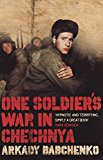
One Soldiers War in Chechnya PDF
Preview One Soldiers War in Chechnya
Arkady Babchenko didn't write about fighting in Chechnya to make his name as an author, nor to mount a political attack against Russia's rulers. He wrote to recover. "Writing was the only thing that helped," he says of the months following his demob. "If I hadn't started writing, I might have lost myself to drink. It was the only real cure. What poured out of him is an unflinchingly un-macho record. No comforting heroes or villains; no familiar arc of near-defeat and triumph-against-the-odds. Instead Babchenko presents us with a relentless account of fear, boredom, confusion, filth, cold, disease, hunger, thirst and lingering dread. These notes became One Soldier's War in Chechnya, his memoir of the Chechen conflict. The Russian army is a dangerous place, even in peace, even miles from the enemy. One Soldier's War is probably at its most disturbing - and most powerful - when Babchenko describes the younger soldiers cowering in fear of the older men. Drunk, seemingly deranged bullies drag them out of bed, half-kill them, threaten to rape them and then beat them all over again for daring to have black eyes. But almost as shocking is the inability of Russia to provide even the basics for its soldiers. Babchenko describes soldiers grazing on berries "like moose" or drinking water tainted with rotting human flesh. A soldier, he believes, has the best chance of survival when he no longer cares whether he lives or dies. "If you think 'a year after the war I'll become a writer', then fate will get you - kill you. Fate is a very subtle, a very sensitive system. You need to be as imperceptible as possible. Then maybe it won't touch you."
**
